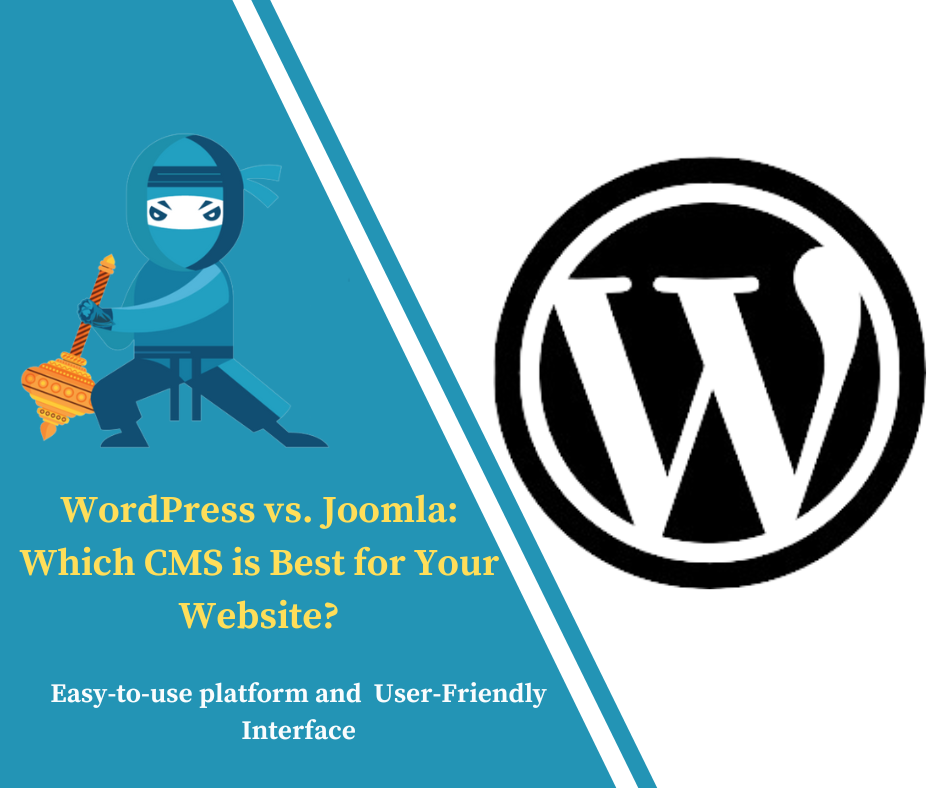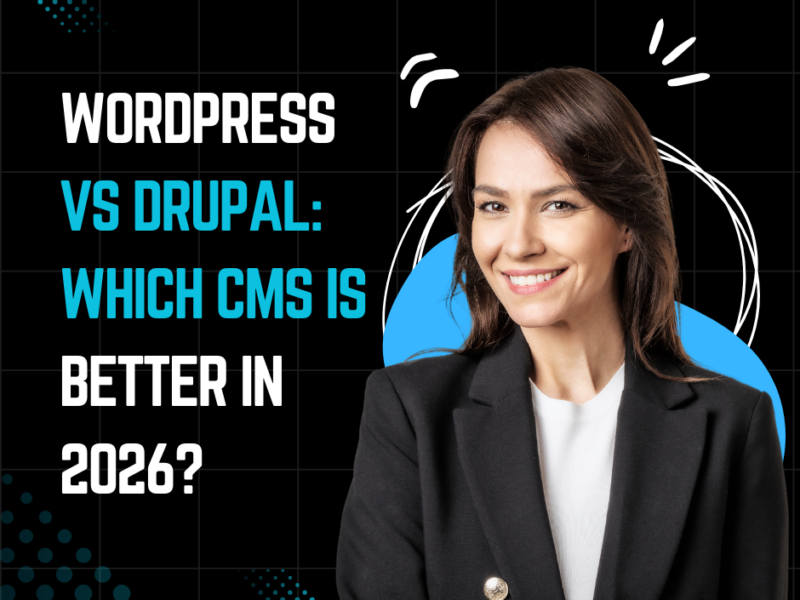WordPress vs. Joomla: Which CMS is Best for Your Website?
Choosing the right Content Management System (CMS) can make or break the success of your website. With so many CMS options available, two of the most popular choices are WordPress and Joomla. Both offer a variety of features, ease of use, and customization options, but which one is better for your needs? In this article, we’ll compare WordPress vs. Joomla to help you decide which CMS is best for your website.
Overview of WordPress and Joomla
WordPress and Joomla are open-source CMS platforms that allow users to create and manage websites without needing advanced coding skills. They both have their unique advantages, but their differences make them suitable for different types of users.
WordPress is the world’s most popular CMS, powering over 40% of all websites on the internet. It’s known for its ease of use, flexibility, and a massive selection of plugins and themes.
Joomla is also a widely used CMS with powerful features and the flexibility to create complex websites. It’s often chosen by users who need more control over their site’s structure and functionality.
Let’s dive into the key aspects that set WordPress vs. Joomla apart and help you determine which platform suits your needs.
1. Ease of Use
WordPress is known for its user-friendly interface. Even beginners can easily set up and start customizing their site within minutes. The installation process is straightforward, and most web hosts offer one-click WordPress installation. The dashboard is intuitive, allowing users to add content, install plugins, and customize themes without any technical knowledge.
Joomla, on the other hand, is not as beginner-friendly as WordPress. While it’s still relatively easy to use, Joomla has a steeper learning curve. The setup process is more complex, and the dashboard might feel overwhelming for users who are new to CMS platforms. Joomla is better suited for users who have some prior experience with web development or are willing to spend time learning how to use it effectively.
Verdict: For beginners and users looking for a quick and easy setup, WordPress is the better option.
2. Customization Options
When comparing WordPress vs. Joomla, customization is a key factor to consider. Both platforms offer a range of themes and extensions to help users tailor their websites to their specific needs.
WordPress boasts an extensive library of plugins and themes, many of which are free. There are over 60,000 plugins available, covering everything from SEO optimization to e-commerce solutions. The sheer number of options makes it easy for users to add new features and functionality to their website without coding.
Joomla also offers a variety of extensions and templates, but not as many as WordPress. However, Joomla’s extensions are known for their versatility and ability to handle complex functionality. Joomla provides greater flexibility when it comes to customizing content types, which makes it ideal for websites that require detailed content management.
Verdict: If you want a wide range of customization options and ease of use, WordPress is the winner. However, if you need more control over content types and complex features, Joomla might be a better fit.
3. SEO Capabilities
SEO is crucial for any website, and both WordPress and Joomla offer tools to improve your site’s visibility on search engines.
WordPress has several SEO plugins, such as Yoast SEO and All in One SEO, that make optimizing your website straightforward. These plugins provide suggestions on how to improve your content, meta descriptions, and keyword usage, making it easier for users to boost their search rankings.
Joomla also has solid SEO capabilities, with built-in tools that allow you to set meta descriptions, keywords, and URLs. However, Joomla’s SEO settings are more manual compared to WordPress, which may be challenging for beginners.
Verdict: WordPress is more user-friendly for SEO, thanks to its plugins. Joomla provides good SEO options but requires more effort.
4. Security
Security is a critical aspect when comparing WordPress vs. Joomla. Both platforms have strong security measures, but there are differences in how they handle security.
WordPress is frequently targeted by hackers due to its popularity. However, the platform has numerous security plugins that help protect websites from attacks. The key to maintaining a secure WordPress site is regularly updating the core software, themes, and plugins.
Joomla offers more advanced security settings out of the box. It includes features like SSL compatibility and two-factor authentication without needing additional extensions. Joomla’s smaller user base also means it is less frequently targeted by hackers, which can be an advantage for security-conscious users.
Verdict: Joomla has stronger built-in security features, while WordPress requires more plugins and updates to stay secure.
Also read: Shopify vs. Squarespace: A Complete Guide for E-Commerce Newbies
5. Content Management
Content management is where WordPress vs. Joomla shows some significant differences.
WordPress is ideal for blogging and content-heavy websites. Its post editor is user-friendly, allowing users to add media, format text, and schedule posts effortlessly. The Gutenberg block editor makes it easy to create visually appealing pages with a drag-and-drop interface.
Joomla offers a more complex content management system, which allows for more advanced categorization and content structuring. Joomla’s flexibility makes it suitable for websites that require multiple content types or custom layouts.
Verdict: For straightforward content creation and blogging, WordPress is the better choice. For more advanced content organization, Joomla has the edge.
6. Community Support
Both WordPress and Joomla have active communities that provide support and resources for users.
WordPress has a larger community, which means more forums, tutorials, and online resources are available. Users can find answers to almost any question, and many developers are offering professional support.
Joomla also has a supportive community, but it’s smaller compared to WordPress. While you can still find plenty of resources, there may be fewer tutorials and third-party support options.
Verdict: WordPress wins in terms of community support due to its larger user base.
7. E-commerce Capabilities
If you’re planning to build an e-commerce website, both WordPress and Joomla offer solutions.
WordPress relies on plugins like WooCommerce to add e-commerce functionality. WooCommerce is powerful and easy to use, making it a popular choice for online stores of all sizes.
Joomla has its e-commerce extensions, such as VirtueMart, which offer comprehensive features. However, these extensions are less user-friendly compared to WooCommerce and may require more technical expertise to set up.
Verdict: For a simple and powerful e-commerce solution, WordPress with WooCommerce is the better choice. Joomla can handle e-commerce, but it may require more effort to implement.
8. Cost
Both WordPress and Joomla are free to use, but there are costs associated with hosting, themes, and extensions.
WordPress offers many free themes and plugins, but premium options are available for those who want more advanced features. Hosting costs vary depending on your requirements, but most web hosts offer affordable WordPress hosting plans.
Joomla also has free and premium extensions, and hosting costs are similar to WordPress. However, Joomla’s extensions tend to be more expensive, which can add to the overall cost if you need advanced functionality.
Verdict: WordPress is generally more affordable due to its wide range of free themes and plugins.
Final Verdict: WordPress vs. Joomla
When it comes to choosing between WordPress vs. Joomla, it ultimately depends on your needs and experience level.
Choose WordPress if you’re a beginner, want an easy setup, and need access to a vast selection of themes and plugins. WordPress is ideal for blogs, small businesses, and simple e-commerce sites.
Choose Joomla if you have some technical experience and need more control over your site’s structure and functionality. Joomla is suitable for more complex websites, such as online communities and websites requiring multiple content types.
FAQ
Which is easier to use, WordPress or Joomla?
WordPress is easier to use, especially for beginners. It has a more intuitive interface and simpler setup compared to Joomla, which has a steeper learning curve.
Can I use WordPress or Joomla for e-commerce?
Yes, both platforms can be used for e-commerce. WordPress uses WooCommerce, which is easy to set up, while Joomla has extensions like VirtueMart, which may require more technical knowledge.
Which platform is better for SEO?
WordPress is generally better for SEO because of its powerful plugins like Yoast SEO. Joomla also has good SEO features but requires more manual configuration.
Is Joomla more secure than WordPress?
Joomla has more advanced security features built-in, while WordPress requires additional plugins to achieve the same level of security.
Which CMS has more customization options?
WordPress offers more themes and plugins, making it easier to customize. Joomla provides greater control over content structure, which is better for complex sites.
How much does it cost to build a website with WordPress or Joomla?
Both platforms are free to use, but costs will vary depending on hosting, themes, and extension.
Conclusion:
When choosing between WordPress vs. Joomla, it ultimately depends on your specific needs, technical expertise, and the type of website you want to create.WordPress is the go-to choice for beginners, small business owners, and bloggers looking for an easy-to-use platform with a wide range of plugins and themes. Its flexibility, user-friendly interface, and strong community support make it an excellent option for most website projects, including e-commerce.








